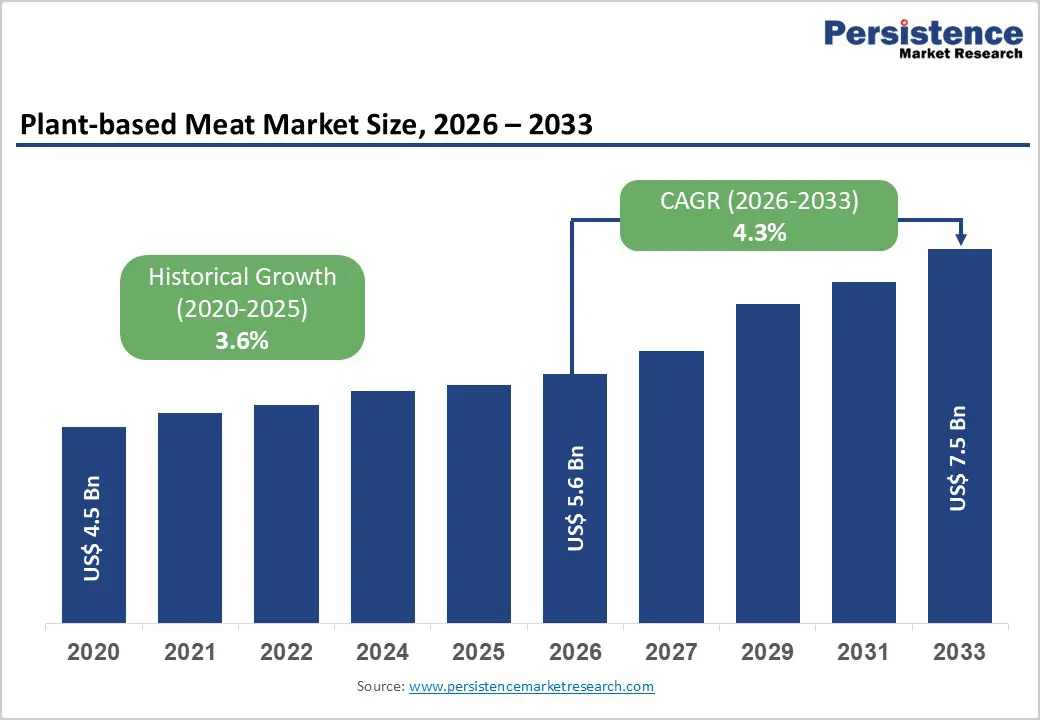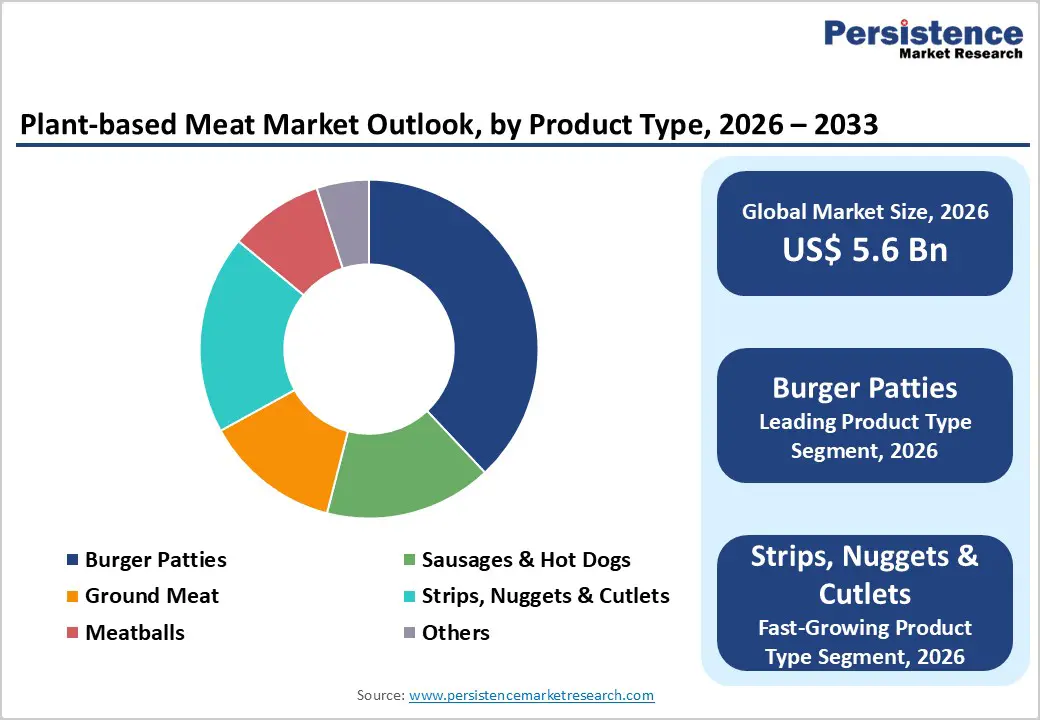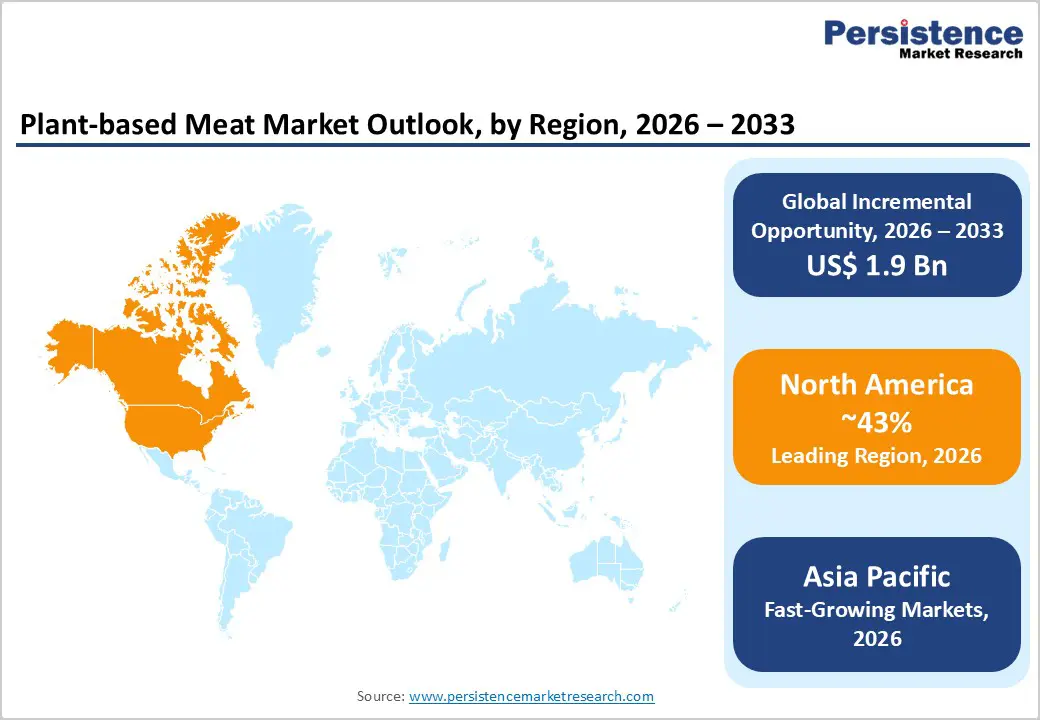ID: PMRREP24592| 192 Pages | 28 Jan 2026 | Format: PDF, Excel, PPT* | Food and Beverages

The global plant-based meat market size is expected to be valued at US$ 5.6 billion in 2026 and projected to reach US$ 7.5 billion by 2033, growing at a CAGR of 4.3% between 2026 and 2033.
Plant-based meat is rapidly redefining protein consumption, appealing to health-conscious, environmentally aware, and flexitarian consumers seeking familiar textures and flavors without animal ingredients. Innovation is shifting the category beyond burgers and sausages into whole-cut, seafood, and hybrid formats, creating a dynamic market with high growth potential and evolving consumer expectations.
| Key Insights | Details |
|---|---|
| Global Plant-based Meat Market Size (2026E) | US$ 5.6 Bn |
| Market Value Forecast (2033F) | US$ 7.5 Bn |
| Projected Growth (CAGR 2026 to 2033) | 4.3% |
| Historical Market Growth (CAGR 2020 to 2025) | 3.6% |

Convergence of health, sustainability, and ethical considerations motivates consumers to reduce conventional meat intake. Surveys in the U.S. and Europe cited by the Good Food Institute show that over 60% of plant-based meat buyers identify as flexitarians, seeking products that deliver meat-like satisfaction with perceived benefits such as lower saturated fat and reduced environmental impact.
Life-cycle assessment studies referenced by GFI highlight that plant-based meats can generate up to 90% lower greenhouse gas emissions and require significantly less land and water than beef, aligning with climate targets and corporate sustainability strategies. These attributes are compelling retailers and foodservice operators to maintain shelf and menu space for meat alternatives, even as they refine assortments, supporting steady medium-term demand across categories like burger patties, sausages & hot dogs, and strips, nuggets & cutlets.
First-time trial rarely guarantees long-term loyalty in plant-based meat, as repeat purchases hinge heavily on taste, texture, and overall eating satisfaction. Many products still struggle to consistently replicate the savory depth, juiciness, and mouthfeel of animal meat across cooking methods. Off-notes, dryness after reheating, or rubbery textures can quickly erode consumer trust, especially among flexitarians who directly compare plant-based options with conventional meat rather than viewing them as substitutes.
Beyond sensory gaps, elevated consumer expectations create pressure that few products sustain over time. Early novelty has faded, and buyers now expect plant-based meats to deliver indulgence, familiarity, and value at every purchase. Inconsistent quality between batches, limited culinary versatility, and fatigue from repetitive flavor profiles discourage routine consumption, turning many trial users into occasional buyers rather than committed repeat customers.
A high-value opportunity is emerging around plant-based seafood analogues and mycoprotein-driven innovation, addressing categories that remain underdeveloped compared to burgers and sausages. Whole-cut fish alternatives, shellfish analogues, and spreadable seafood formats respond directly to consumer demand for variety, nutritional credibility, and culinary realism. Advances in fermentation, extrusion, and precision structuring enable products that better replicate flaky textures, fibrous bite, and ocean-style mouthfeel.
Mycoprotein, algae, and fungal proteins offer strong amino acid profiles, neutral flavor bases, and lower environmental footprints, supporting both performance and sustainability positioning. As retail and foodservice buyers seek differentiated plant-based offerings beyond saturated meat analogues, suppliers that can scale proprietary protein platforms and deliver convincing seafood experiences stand to unlock incremental demand, premium pricing, and stronger long-term category expansion.
Among product categories, burger patties are expected to remain the leading segment, accounting for approximately 38% of the global plant-based meat market in 2025. Burgers served as the original flagship format for companies such as Beyond Meat, Inc. and Impossible Foods Inc., offering flexitarian consumers a familiar, direct alternative to conventional beef burgers. High-profile quick-service restaurant collaborations, including Burger King’s Impossible Whopper and limited-time plant-based launches by McDonald’s, accelerated mainstream visibility and trial. Retailers further reinforced this momentum by expanding private-label plant-based burger assortments. While volume growth has moderated in certain mature markets, burger patties continue to anchor category value by driving brand recognition and first-time adoption. This “gateway” role supports downstream sales of related products such as sausages, meatballs, and ready meals, helping sustain the segment’s leading share.
By protein source, soy-based products are projected to hold the largest share, at around 45% of the global plant-based meat market in 2025. Soy has a long-established role in meat analogues, with formats such as tofu, tempeh, and textured vegetable protein offering high protein quality and reliable functional properties, including water retention and fibrous texture formation. Major players such as Beyond Meat, Inc., Nestlé S.A., through its Garden Gourmet and Sweet Earth brands, along with numerous Asian manufacturers, continue to rely on soy due to its mature supply chains and cost efficiency. Soy is also well understood by consumers and regulators, supported by a clearly defined nutritional profile. Although pea protein is gaining traction due to allergen-avoidance and non-GMO positioning, soy’s balance of performance, availability, and affordability is expected to preserve its leadership over the medium term.

North America holds approximately 43% market share in the global North America Plant-based Meat Market, reflecting early adoption, strong retail penetration, and continuous product reinvention. In the United States, brands are shifting focus from heavy processing toward shorter ingredient lists, improved taste, and protein blends that balance nutrition with indulgence. Foodservice operators are reintroducing plant-based menus with refined formats such as blended burgers and premium sausages aimed at flexitarian diners.
In Canada, growth is supported by strong private-label expansion and rising interest in plant-based comfort foods tailored to local preferences. Canadian manufacturers increasingly leverage pea and fava bean proteins sourced domestically, aligning with sustainability and supply security goals. Across the region, innovation is moving beyond novelty toward repeat purchase driven by flavor credibility, cleaner labels, and competitive pricing.
Asia Pacific North America Plant-based Meat Market is expected to grow at a CAGR of 8.2%, driven by rapid urbanization, evolving diets, and strong culinary adaptability. In China, plant-based pork and chicken analogues aligned with traditional dishes are gaining traction through quick-service chains and e-commerce platforms. Local players emphasize texture and cooking performance suited to stir-frying and dumpling applications.
In India, demand is shaped by a large vegetarian population seeking protein-rich alternatives compatible with regional flavors, while Japan focuses on hybrid products blending plant proteins with familiar food formats. South Korea shows rising interest in plant-based convenience foods, supported by modern retail and café culture. Across Asia Pacific, localized formulations and affordability are becoming decisive growth enablers.

The global plant-based meat market shows a moderately fragmented competitive landscape, marked by the presence of established food players alongside agile startups. Leading companies are refining formulations to improve taste, texture, and cooking performance while shifting toward clean-label ingredients that resonate with ingredient-conscious consumers. Product innovation focuses on whole-cut formats, hybrid proteins, and region-specific flavors, supported by investments in scalable manufacturing and automation to improve cost efficiency.
Startups are injecting momentum through fermentation, mycoprotein, and precision-processed plant proteins, often positioning sustainability at the core of their value proposition. Collaborations with foodservice operators, retailers, and ingredient suppliers accelerate market access and trial. Rising consumer awareness around health and environmental impact, combined with clearer government guidance on labeling and safety, is shaping a more structured and credible competitive environment.
The global plant-based meat market is projected to reach about US$ 5.6 billion in 2026, continuing its expansion from US$ 4.5 billion in 2020 amid growing flexitarian diets and retailer support.
A key demand driver is the convergence of health, environmental, and ethical concerns, with consumers seeking products that offer meat-like taste and texture while lowering greenhouse gas emissions and aligning with animal-welfare values.
North America currently leads the global market with roughly 43% share in 2025, owing to high product availability in supermarkets, extensive quick-service restaurant partnerships, and a mature innovation and investment ecosystem.
A major opportunity lies in expanding into high-growth formats such as strips, nuggets & cutlets, and seafood analogues, where convenient, family-friendly, and restaurant-style offerings can broaden household adoption and increase meal penetration.
Leading players include Beyond Meat, Inc., Impossible Foods Inc., Nestlé S.A, Unilever PLC, Maple Leaf Foods Inc., Conagra Brands, Inc., Kellogg Company, Tyson Foods, Inc., Quorn, Revo Foods, and Marfrig Global Foods S.A.
| Report Attribute | Details |
|---|---|
| Historical Data/Actuals | 2020 - 2025 |
| Forecast Period | 2026 - 2033 |
| Market Analysis | Value: US$ Bn, Volume: Tons |
| Geographical Coverage |
|
| Segmental Coverage |
|
| Competitive Analysis |
|
| Report Highlights |
|
By Product Type
By Source
By Distribution Channel
By Region
Delivery Timelines
For more information on this report and its delivery timelines please get in touch with our sales team.
About Author